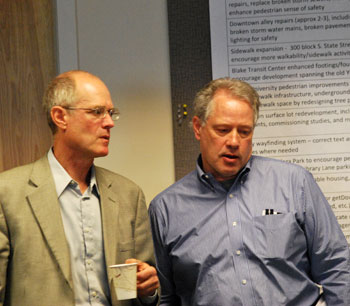DDA Delays Parking Vote Amid TIF Questions
Ann Arbor Downtown Development Authority board meeting (May 2, 2011): At its Monday meeting, the DDA board was expected to ratify its side of a new contract under which the DDA would continue to operate the city of Ann Arbor’s public parking system.

Mayor John Hieftje (left) and DDA board member Roger Hewitt (right) head to their seats to start the DDA's board meeting. (Photos by the writer.)
Instead, the board received this news from the chair of its bricks and money committee: The city has raised the possibility that the DDA might need to return money to various taxing entities – including the city of Ann Arbor – from the taxes captured through the DDA’s tax increment finance district. The city communicated its concern to the DDA on Monday morning, the day of the noon meeting.
The issue concerns the DDA’s TIF plan, which was renewed in 2003, and language in the city’s ordinance establishing the DDA under the state’s enabling legislation. The TIF plan contains projections for the growth in taxable value of property (both real and personal) in the district. The city’s ordinance stipulates that if the actual “captured assessed valuation” grows at a rate faster than the expectation expressed in the TIF plan, then at least 50% of the additional amount must be returned proportionately to the taxing authorities from which the taxes were captured.
The vagueness of the ordinance language leaves several open questions that will require further review by the city attorney’s office and the DDA’s own legal counsel, as well as the financial staff from both organizations.
Those questions include: (1) What’s the relevant time period? (2) Which set of TIF plan estimates are applicable – the one labeled pessimistic, optimistic or realistic? (3) Who is the responsible party for adherence to the ordinance? (4) Does the ordinance language refer to real property only or also to personal property? (5) Do payments already made by the DDA to the city of Ann Arbor out of the TIF for the new municipal center count towards any sum that might need to be returned?
After hearing the news, the board decided to table the resolution on its agenda that would have ratified the DDA’s side of a new parking contract under which it would continue to manage the city’s parking system. [Previous Chronicle coverage: "Column: Ann Arbor Parking – Share THIS!"]
Board members recognized that it would likely be necessary to convene a special meeting of the board, given the city’s need to approve its budget on May 16. Later the same day, on the evening of May 2, the city council struck from its agenda the item that would have ratified the city’s side of the new parking contract. The city council has not yet weighed in on the text of the contract, but did express its view on the financial terms at its April 19 meeting.
As DDA board members absorbed the news about the TIF question, they heard their usual set of reports from their committees and wrapped up the meeting is less than an hour – they had no further business to transact. Board member Russ Collins, who was prepared to call in to the meeting from Detroit, where he’d been summoned for federal jury duty, did not need to do that. [Full Story]




